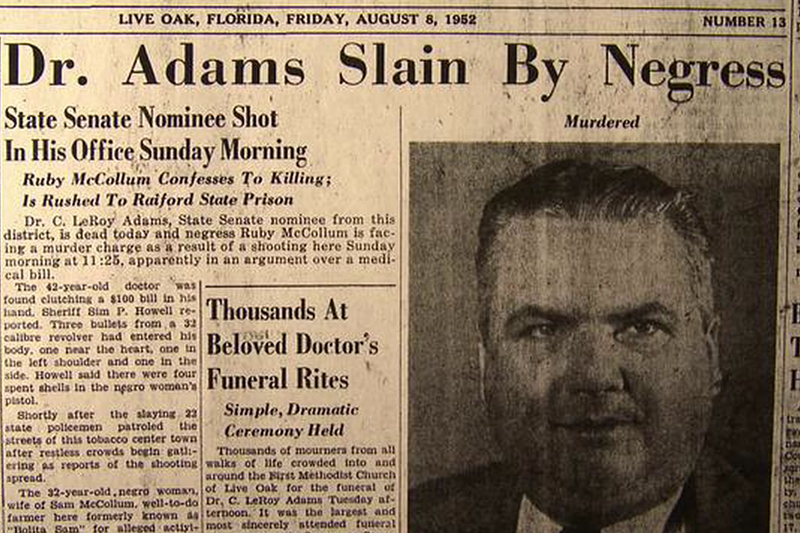Ruby McCollum was arrested and convicted in 1952 for killing Dr. C. Leroy Adams, a prominent white doctor and state senator–elect.
BY KEISHA BELL | Visionary Brief
It is no longer a secret that white men have taken sexual advantage of black women since times of slavery. Laws were widely created around this practice under the principle of partus sequitur ventrem, which means “that which is brought forth follows the womb.”
These laws provided that children born to mothers who were slaves were, therefore, enslaved children. In other words, the biological father held no responsibility for the sexual act or the child created.
These laws established a socially acceptable avoidance of both responsibility and penalty for harm done to black families in general and to black women specifically. Have you wondered whether this attitude continues today, minus the restriction of white men being the sole perpetrators?
Meet Mrs. Ruby McCollum. She was convicted by a jury of first-degree murder on December 20, 1952, for killing Dr. Clifford Leroy Adams, Jr., a white man elected to the Florida state senate.
McCollum testified that Adams repeatedly forced her to have unwanted sex with him. Furthermore, she testified that he insisted that she have his child, the child she identified as her youngest daughter.
According to McCollum, her husband told her he would kill her if she bore another child by Adams, and Adams told her he would kill her if she had an abortion. She testified that she was pregnant at the time of the shooting.
McCollum’s testimony impacted the Civil Rights Movement by publicly exposing this violation commonly done to black women, a practice that was known to have been happening since times of slavery but was condoned through the community’s silence.
McCollum was sentenced to death in the electric chair. Her conviction and death sentence were overturned on a technicality by the Florida Supreme Court on July 20, 1954.
She was the first black woman to testify against a white man’s sexual abuse. Until then, black women were not protected under the law from rape by a white man. McCollum was also the first black woman to testify to a white man’s paternity of their child.
At her second trial, McCollum’s attorney entered a plea of insanity. The prosecuting attorney agreed with the plea, and McCollum was declared mentally incompetent to stand trial. She was committed to the Florida State Hospital for mental patients in Chattahoochee. She remained there until 1974, at which time her attorney successfully filed for her release under Florida’s Baker Act.
McCollum died on May 23, 1992. Her life illustrates a wide spectrum of emotions, achievements, and circumstances. Through her fight for her life and for justice, her case touched the hearts of many white Americans and influenced the progression of civil rights.

Keisha Bell
It is thought by many to have helped change the attitudes regarding the establishment of “protections” given to powerful men engaged in sexual slavery. McCollum’s case reminds us that sexual exploitation and its effects are not limited to plantation practices. Her cries linger.
Keisha Bell is an attorney, author, and public servant.







